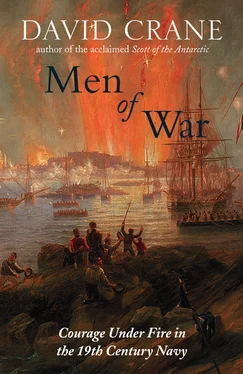which are so admirably calculated to cut off the enemy’s communications with Alexandria and Constantinople and for towing fire vessels and explosion vessels [Cochrane specialities] by night into ports and places where the hostile squadrons anchor on the shores of Greece.
I wish I could give you, without writing a Volume, a clear view of the numerous reasons, derived from 35 years experience, which induce me to prefer a force which can move in the obscurity of the night, through narrow channels, in shoal water, and with silence and celerity, over a naval armament of the usual kind, though of far superior force.
[The steam vessel] will prove the most formidable means that has ever been employed in Naval warfare. It is my opinion that 24 vessels moved by steam … could commence at St Petersburg and finish at Constantinople the destruction of every ship of war in the several ports.
The agreement of the deputies to five new steamships seemed to clear the way to Cochrane’s appointment and the fulfilment of Hastings’s ambition, but nothing to do with the Greek Committee or the Greek deputies was ever as simple as that. It had taken almost three years’ advocacy for Hastings to secure himself even a single vessel, and now suddenly he found himself facing the bitter prospect of seeing his own pet project losing out to the more grandiloquent demands of Cochrane’s steam ‘fleet’. ‘I fancy you have lately received a letter from the Greek Deputies complaining of the delays of Mr Galloway in putting up the machinery on board of the vessel built by Mr Brent,’ he was soon writing to John Cam Hobhouse, Byron’s old friend and a leading member of the Greek Committee, ‘& I consider the conduct of Mr Galloway so totally devoid of candour that I also feel myself obliged to appeal to you on the subject.’
For Hastings and Greece time and not money was the issue, and the gist of his complaint was that Galloway was stalling on his vessel so that he could economise by fitting all six engines at the same time. ‘The Greeks have long looked forward to a steam vessel as the arm that would assure them success,’ he went on, in a disingenuous projection of his own hopes, ‘& have been daily led to expect the arrival of one; what then is likely to be the impression on their minds when they behold the Egyptian fleet with a steam vessel without having one to oppose it? The Greeks (like all barbarous people) are easily depressed; are easily elated and the sight of a steam vessel under this flag would inspire them with unlimited confidence, the sight of the enemy one will inspire them with a corresponding terror.’
With a son loitering in the ‘flesh-pots’ of Alexandria, as Hobhouse put it, Galloway’s philhellene loyalties came under regular suspicion, but Hastings’s more pressing concern was with an older and more familiar ‘enemy’ than the Egyptians. ‘If six vessels are equipping & getting in a warlike manner at the same time,’ he warned Hobhouse, ‘such an act of impudence will again call forth some strong measure on the part of our Government – rely upon it the Government knows everything about this affair which it desires to know, & if it chooses to stop it, will do so in spite of us – if the existing laws do not suffice others would be enacted, & if driven to extremities they would direct their naval commanders to arrest us even out there.’
With a Foreign Enlistment Act forbidding British nationals from serving under foreign flags, and the government’s continuing ambivalence towards the Greek insurgents, this was no idle fear. Since the suicide of Castlereagh in August 1822 there had certainly been a perceptible softening of official attitudes, yet at a time when Britain was seeking a negotiated settlement to the Greek problem, the prospect of British foundries producing weapons and British dockyards building ships to destroy the fleet and capital of an allied country was awkward enough without the inevitable publicity surrounding everything in which Cochrane was involved.
It would, in fact, have taken a brave government – probably braver than Lord Liverpool’s at any rate – to have moved against Cochrane as it had done ten years earlier, but for once in his life he too was taking no chances. At the beginning of November he was warned by the opposition Whig politician Henry Brougham that he risked arrest if he remained in England, and on 9 November 1825 – the same day that Hastings was writing to alert Hobhouse to the danger – he slipped across the Channel with his wife and son to continue his preparations beyond the reach of a Tory establishment he had been hounding and exasperating for more than twenty-five years.
With Cochrane now constantly on the move, and coded letters, government spies, hand-delivered communications the order of the day, the delays endemic to everything to do with Greek affairs could only be exacerbated. ‘My Lord, I had the honour of meeting your brother this day,’ Hastings wrote to Cochrane at the end of November,
who informed me that an opportunity would offer of writing to your lordship, so that I profit by it to inform you that the first vessel called the Perseverance is nearly ready inasmuch as it concerns Mr Brent. Mr Galloway is sadly behind – he now promises to be ready in one month, & his month may be considered as two. I have used every method & every argument to hasten him – the fact is the fate of Greece is in his hands & he will have a great responsibility on his shoulders if that cause is lost by his want of punctuality … If your Lordship would use your influence with Mr Galloway to hasten the Perseverance you would render very important service to the cause & to me if Greece is yet to be saved – but I fear ’tis too late.
The guns were now ready, he told Cochrane – Hastings favoured shipping them out to Greece via America – but even at his gloomiest his estimates for the ship’s completion were hopelessly optimistic. By the middle of December Galloway’s idea of a month had grown to six weeks, and as February 1826 turned into March and April, the engineer gradually metamorphosed from a self-deluding optimist into the ‘incorrigible … impudent liar’ and criminal incompetent of Hastings’s increasingly furious complaints.
With the delays and setbacks to the engines, and the endless work supervising the design and building of the ship’s boats, or liaising between the Greek Committee and their absentee admiral, it would have taken a more patient man than Hastings to control his temper. Galloway, he thought, should be hanged. Orlando, one of the Greek deputies, was an ‘insupportable blockhead’ more interested – like all the rest of them – in ‘some affaire de putain’ than in Greece. ‘Before I close this letter,’ he wrote to Cochrane at the beginning of February – just about as close as he allowed himself to a warning shot across the Admiral’s bows – ‘I must remark that Mr Hesketh has conducted himself in a meddling interfering manner very ill-suited to his station, & as I feel satisfied that such comportment is contrary to your sanction I take the liberty of requesting you will instruct him to limit himself in future to delivering your orders & reserve his own opinions for those who value his opinions more highly than I do.’
It is probably not just hindsight that detects a note of irony in a reference to the ‘great man’ in his letters, but neither of them could afford to fall out. Among the leading figures of the Greek Committee were several of Cochrane’s old political allies, but when it came to naval matters, he needed the ‘indefatigable Hastings’ just as badly as Hastings needed Cochrane to stop a vacillating Greek government from whoring after some crack-brained solution or Bavarian fantasist to solve their military problems.
Hastings was also the one foreigner who had been able to give Byron, Cochrane or the Committee a clear-eyed sense of the kind of men they were dealing with in Greece. The two naval leaders of whom he spoke most warmly were Canaris and Miaulis – ‘a very distinguished worthy old man’ – but for every Greek of ability or courage, there were half a dozen drunkards, pirates, cowards and rogues: ‘a merchant of distinction but nothing more … does not so much want talent as ferocity … wants courage … entirely ignorant … consumes three bottles of Rum a day … said to be a very great coward … no consequence … exceedingly intriguing … undistinguished except by a colossal stature & a ferocious countenance … a great rogue … detested but I know not why …’ ‘The fact is that the Greek does not in general possess either courage, or generosity & scarcely patriotism,’ he concluded, finding what comfort he could in so dire a catalogue of venality, greed and vice:
Читать дальше











